#western idealism
Explore tagged Tumblr posts
Text
I Must Make The Most Of This Person. They Must Be The Best They Can Be
0 notes
Photo

The floral symbolism of the great masters by Elizabeth Haig
https://www.gutenberg.org/ebooks/70433
To explain completely even so small a branch of Christian symbolism as that of flowers, an exhaustive knowledge is required of the development of Christian theology, and of the varying force with which different doctrines appealed at different times to the public mind. But still, these notes may be of some interest to those who care to trace in the work sanctioned by the Church and reverenced by the people the history of Western idealism, and who are sometimes puzzled by the conventions employed by the Masters to illustrate the Divine Mysteries.
#floral symbolism#symbolism#christian symbolism#western idealism#divine mysteries#flora#flowers and leaves#project gutenberg
1 note
·
View note
Text
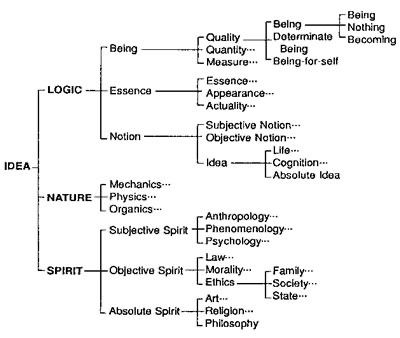
Hegel’s logic deals with the development of God's thinking, prior to the creation of the world, and is called heavenly logic. However, unlike formal logic, it does not merely deal with the formal laws of thought. Although it holds itself to be the development of God's thinking, it attempts to deal with the most universal definitions and laws of reality.
#georg wilhelm friedrich hegel#hegelianism#hegelian dialectic#hegel#philosopy#german philosophy#western philosophy#metaphysics#absolute idealism#idealism#miscellanea
939 notes
·
View notes
Text
I know some dickheads have now decided that Judaism is the "bad, violent, terrorist religion" and Islam is the "good, peaceful" one, which is only to be expected of white people, but how much of an issue is it currently? Like I've seen some USAmericans sharing how the Islamic faith shapes Gazans values and perseverance (good) except with that distinct white hippie "I'm about to imprint on this like the world's most racist duck" vibe (bad), but I didn't think they're already turning on Judaism in numbers.
Do they realize that Christianity is also the same kind of comfort to Christian minorities in Asia and Africa? That it was Buddhists that genocided the Rohingyas in Myanmar and Tamils in Sri Lanka? That Hindu fundamentalists are even now trying to ethnically cleanse Muslims in India? How Hindus and Christians are terrorized and persecuted in Pakistan? That Muslims have a history of persecuting and ethnically cleansing Jews too?
Really tired of asking y'all to be normal about people's religions man. There's no religion that's inherently violent or exceptionally peaceful. It's just like any other ideology that becomes a weapon in the hands of ethnic power. Interrogate power, not religion, and respect people's belief systems insofar as they aren't in your business.
Edit: I've amended the "long history" of Muslim persecution of Jews because it might be misleading in the current political climate. Zionism and antisemitic Arab nationalism are twin births resulting directly from Christian colonization, and Islamic empires tended to actually be more tolerant of other religions compared to Christianity, especially Judaism, which was considered a sibling religion. Antisemitism wasn't ideologically entrenched in Islamic tradition. It's simply that ethno-religious power will lead to ethno religious domination and intermittent cleansing of minorities, and Islam is no exception. Humans be humaning always.
#Edit: please boost the edit#why can't white people just be fuckin normal for once#tbh this site was so weird about Judaism that it felt almost culty#I had several crises about whether I was being antisemitic before I realized no I'm just reacting to the idealization-demonization binary#that seems to be all western leftists know how to do#white queers are the worst about this#and now some of the asks I've been getting gives me the impression that the west thinks ''Islamist'' is some kind of dangerous cryptid#y'all attach insane levels of importance to people's choice of headgear#the only common denominator of all the Muslims I know is their fixation on biriyani idk#a lot of white lefties just want to use religion to distance yourself from your white privilege#same reason as why communism is so attractive to you#y'all want to share in a legacy of oppression because it's easier than self-reflection and unlearning#antisemitism#anti Zionism#Islamphobia#philosemitism#white queers#western leftists#racism#religious fundamentalism#genocide#religious violence#knee of huss
2K notes
·
View notes
Note
I have no other place to yap this to so I apologise in advance.
I find it interesting in Alhaitham and Kaveh’s voicelines they tend to talk about each other A LOT in a way of complaining. Such as in Alhaitham’s Good night voiceline where he says that he’d prefer that Kaveh wouldn’t be home at all because all the chaos and noise he makes in the dead of the night. Or in Kaveh’s Good Morning voiceline where he says that he hopes that you don't run into someone who ruins your day first thing in the morning.
I guess it’s what makes other people think that they despise each other’s company. Yet they’re always viewed as a pair and Alhaitham could’ve kicked Kaveh out of the house ages ago. But what’s your opinion on that?
Hiya! there's no need to apologise, this is a safe space for all haikaveh! When I tell you your ask is scratching my brain I mean ITCHING, I have so many thoughts about this part of their dynamic so thank you for enabling me <3 This turned out to be rather long, so I hope it’s helpful to you!
The contention in both Alhaitham and Kaveh’s character stories and voice lines seems to be to create intrigue about the two as individuals, and, in turn, their relationship.


Alhaitham’s ‘good night’ voice line instantly serves as a contradiction to his character. It’s interesting, and telling, that Alhaitham, who is essentially Kaveh’s landlord, and mentions this within his fourth character story, alludes to Kaveh by using ‘roommate’ rather than ‘tenant’. ‘Landlord’ evokes a position of authority over the tenant, whereas ‘roommate’ indicates an equality between two people sharing a house – since it’s Alhaitham who advocates for the term ‘roommate’, it’s telling that, as opposed to what Kaveh believes, Alhaitham wants to establish equality between them.

In terms of what Alhaitham says in this voice line, it explicitly raises a contradiction in the form of a question: if Alhaitham is truly bothered by his roommate’s antics, why doesn’t he simply evict Kaveh?
This is relevant as this question is also posed when we initially meet Kaveh within the Archon Quest, as Kaveh states he dislikes Alhaitham’s personality, to which Alhaitham responds by saying if he bothers Kaveh so much, Kaveh always has the option to move out of the house – to which Kaveh perceives as a threat, only to then dismiss this as Alhaitham ‘changing the subject’, which seems to mean that this ‘threat’ is taken as baseless. As this isn’t called back to, this seems to be the case.


There is no real threat of eviction, and regardless of their disputes, Alhaitham ultimately gives Kaveh no ultimatum to move out. In fact, as discussed here (page 27), as we are meeting Alhaitham and Kaveh for the first time, Alhaitham allowing Kaveh to live with him contradicts his established character of living a life free of inconvenience. This instantly creates intrigue around his and Kaveh’s dynamic – who is Kaveh to Alhaitham for this exception to be made to Alhaitham’s peaceful way of life?
(An additional note of interest is that Alhaitham’s solution to the noise problem seems to be more uncomfortable than calling on Kaveh and telling him to stop his work. Alhaitham says that he’d rather not wear his noise-cancelling earpieces to bed, implying that he does so when noise is a problem at night. However, there’s no mention of Kaveh being stubborn when confronting this issue, which is why he takes to wearing his ear pieces, or any mention of confrontation at all. From this voice-line, it seems that Alhaitham avoids interaction by opting for the least comfortable option, which can be a contradiction to his character. As this is a rather brief voice-line, it’s difficult to ascertain why, but I like the idea that Kaveh is productive at night, and Alhaitham prefers not to impose on Kaveh’s work process – but this is more a headcanon than evidenced interpretation.)
Returning back to the contradiction within this voice-line, at a surface glance, this does appear to be a general complaint about Kaveh, and this can be found in Alhaitham’s lines about Kaveh, and also when discussing Tighnari. Alhaitham refers to Kaveh as ‘overly sensitive’, and ‘constantly making a fuss’.
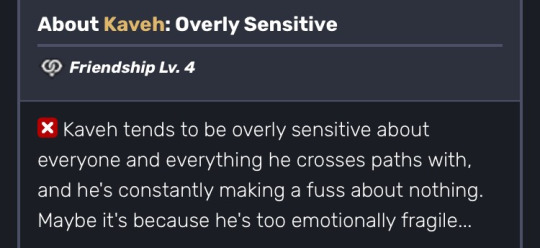
These can easily read solely as complaints, but when looking to the original CN translation, another interpretation can be found here. Alhaitham describes Kaveh as ‘caring’ or ‘tender’, which is exactly how Kaveh is described within the 3.6 special program (as per minimushiroom on twt), which can allude to how Kaveh is considerate to a fault, in that this serves as a detriment to himself.
This can be seen in Alhaitham’s other Kaveh-centred voice-line, in which he describes Kaveh buying keychains in order to provide meals for sick children, even though healthcare is free in Sumeru. Alhaitham clearly holds the view that this was a redundant action, as Kaveh, being in debt, most likely doesn’t have the money to spend on such investments that are, evidently, dubious.
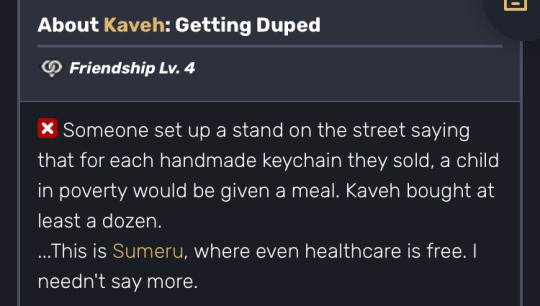
As Alhaitham provides a rational view here, this contrasts with Kaveh’s act of generosity fuelled by emotion – which highlights the contention Alhaitham has with Kaveh, in that Kaveh places himself in dangerous situations for the sake of others. However, as this can be perceived as a solely derisive line, this essential context is lacking, and can be easily misconstrued. (I think the EN translation here also coincides with this narrative, as minimushiroom notes that the original CN has Alhaitham refer to Kaveh’s sensitivity in a positive way, rather than contemptuously, as the English can be interpreted as.)
Kaveh, similarly, can be seen to complain about Alhaitham in his own voice-lines. This can be seen in the 'Good Morning' voice-line you've mentioned, where Kaveh complains about having to see Alhaitham in the morning, which 'ruins' his day. Additionally, Kaveh's voice-lines discussing Alhaitham refer to Alhaitham as ‘infuriating’ and not wanting to give Alhaitham the satisfaction of thanking him, despite Alhaitham helping him out. However, there is more nuance in these voice-lines than Kaveh simply ‘disliking’ Alhaitham, as this dislike is never stated - rather that he and Alhaitham have a difficult relationship in comparison to the ‘close’ friendship of their past.


Kaveh describes their relationship being a ‘mixed bag’, of both negatives and positives, as well as establishing a thorough understanding of Alhaitham, where other people may misinterpret Alhaitham as they ‘don’t know him well enough’. Additionally, Kaveh notes that he knows that Alhaitham can present himself in a more ‘likeable’ manner, but that Alhaitham refuses to do so, which refers to Kaveh’s contention with Alhaitham discussed within his character stories. This, in turn, generates curiosity, as it appears that Kaveh holds an in-depth knowledge of Alhaitham that the player isn’t privy to.
Referring back to Alhaitham’s ‘Good Night’ voiceline, the question raised is, if Alhaitham has a problem with Kaveh, why doesn’t he just evict Kaveh? And the answer can be found by digging further into Alhaitham’s character stories. Looking to Alhaitham’s fourth character story, it states that he is aware of the dissatisfaction Kaveh may have with their living arrangement but that ‘it matters not to him’.
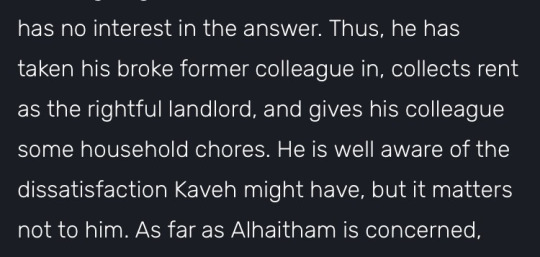
This means that he is aware that Kaveh may be unhappy with having to rely on someone else for a stable livelihood, something which his pride doesn’t naturally allow, but that this is also exacerbated due to their previous falling out and the current contentions Kaveh has with him.
At first, this can seem rather abrasive, which does fall in line with Alhaitham’s egoism as this doesn’t directly impact ‘the self’ (discussed further here), however, what immediately follows is Alhaitham’s belief that he and Kaveh are mirrors, in that his own perspective of the world will be enhanced - in the og CN, ‘completed’ -by Kaveh’s own world view.

The implication generated here with the explicit term ‘mirror’, is that, just as Alhaitham benefits from Kaveh, Kaveh, in turn, can benefit from Alhaitham. (As a side note, it is interesting then that the voice-lines in question can be seen to mirror each other – Kaveh mentions Alhaitham in ‘Good Morning’ whereas Alhaitham mentions Kaveh in ‘Good Night’.)
Returning back to Alhaitham’s character story, rather than merely reflecting each other philosophically speaking, I’d say that this also points to their respective progression as people, not just scholars.
To me, this is reminiscent of what Alhaitham says to Kaveh in A Parade of Providence – being ‘correct’, ultimately, doesn’t matter, as there is no ‘correct’ path in life, meaning that there is no ‘correct’ philosophy to shape and guide a person. Rather, Alhaitham asserts that, ultimately, their opposing philosophies are not the issue that exists between them.


The issue that does exist, then, can be surmised from Alhaitham’s actions during the event (discussed further here), in which he researches into Sachin to gauge his influence over Kaveh’s father journeying into the desert, with implicit hopes of providing closure for Kaveh, and potentially assuaging Kaveh’s guilt. This is a personal act with a personal motive; the underlying motive being concern, as opposed to an assertion of ‘correctness’.
In my opinion, I think Alhaitham’s actions during A Parade of Providence are a direct reference, and fulfilment, of Kaveh’s fifth character story. I’ve discussed here that the main reason for the ending of their friendship was them asserting the correctness of a philosophy over the other, and proposing one philosophy as the ‘solution’ to the other’s perceived flaws.
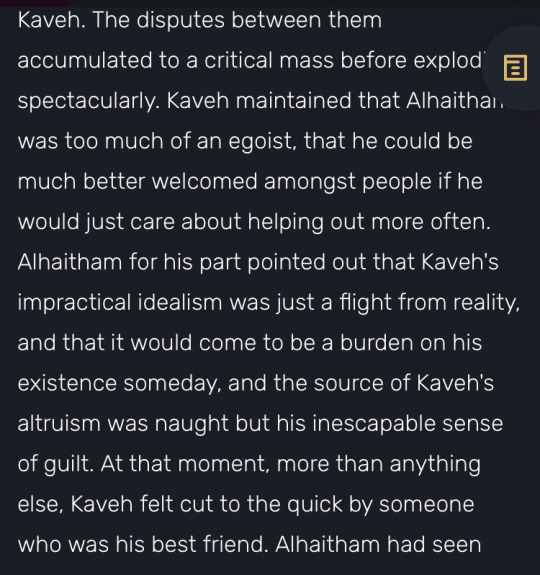

Here Alhaitham can be seen to use Kaveh’s past as the reason for his excessive altruism, implicitly referring to Kaveh’s guilt over being the supposed catalyst for his father’s demise. This final comment of Alhaitham’s appears to be the first time this has been mentioned between them, and it’s enough to be perceived as weaponisation – leading to Kaveh severing their friendship.
In A Parade of Providence, Alhaitham is shown to only have taken the role of commentator to research into Sachin, whose research we are told (by Kaveh), he has no explicit interest in, and it is heavily implied that the only reason he looked further into Sachin, was to prove to link between Sachin and Kaveh’s father. Alhaitham seems to want to absolve Kaveh of this past guilt in hopes that Kaveh will stop placing himself in the cycle of self-sabotage.
For me, when viewing this as a parallel, it highlights that Alhaitham’s motivation in speaking out during their days as students was out of concern for Kaveh, although while holding egoism as ultimately beneficial, and therefore perceivably ‘correct’. The ‘issue’ they’re currently debating is not expressly stated, and although it is unclear if Kaveh understands the implication (as discussed here), as ‘correctness’ has been overturned, there seems to be little left than the personal.
Relating this back to Alhaitham’s fourth character story, for me, Alhaitham referring to Kaveh as a mirror isn’t just referring to Kaveh as a scholar, but a person as a whole. As Alhaitham seeks to improve himself, personally, through Kaveh, it seems that he hopes to be able to benefit Kaveh in turn.
As for Kaveh’s complaints regarding Alhaitham, these can be contextualised within his own character stories. As Kaveh ultimately severed the friendship between him and Alhaitham, Alhaitham offering Kaveh to live with him, despite Kaveh revoking his previous understanding of Alhaitham (as discussed here, page 67), causes Kaveh to be overtly suspicious.
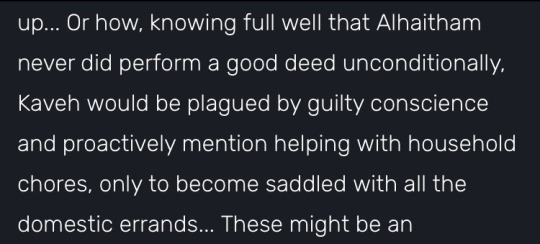
In Kaveh’s Old Sketchbook, it is mentioned that Kaveh believes there to be an ulterior motive for Alhaitham inviting him to share a house, as he believes that Alhaitham wouldn’t do something for someone else without an exchange.
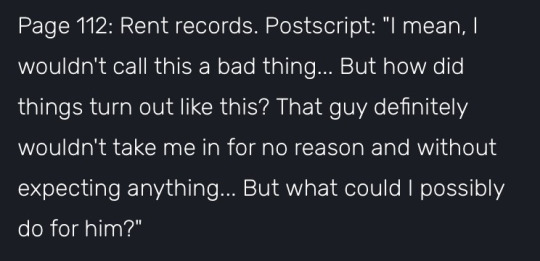
Kaveh, then, openly distrusts Alhaitham due to this unspoken motive, and although he takes on chores to ease his sense of guilt of being a perceived burden, a contention arises here. Due to their previously ended friendship, and with how Alhaitham hurt Kaveh, and how Kaveh may believe he hurt Alhaitham (discussed here), Kaveh sees no reason for Alhaitham to want him around – he treats their relationship as an exchange, asking what Alhaitham could possibly want for him.
Although Alhaitham views Kaveh as a mirror, and therefore, respects Kaveh’s perspectives, Kaveh can potentially view their opposing philosophies as a negative rather than a positive as he had done in the past (as discussed here), as it, perceivably, was what led to the end of their friendship. In this, Kaveh views Alhaitham as disparaging him and his views. As mentioned in his character story, he has no reservations in telling Alhaitham of his debt as Alhaitham has already seen through him in the past, and yet again, upon meeting at the tavern.
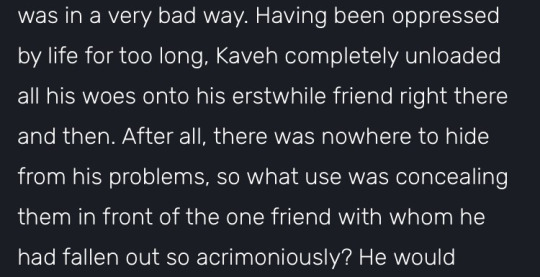
Although Alhaitham perceivably views him unfavourably, and his comments and complaints appear to propagate this interpretation, Alhaitham also seems to have no issue with keeping Kaveh around, and interacting with Kaveh, regardless of the problems Kaveh expressly has with him.
To Kaveh, it could be that as Alhaitham has already seen the worst of him, and appears to have no real issue with their stilted rapport, there is no point in donning a front and using niceties. He is open with his issues with Alhaitham, and, in turn, Alhaitham is open with him.
This appears to be a dual negative and positive for Kaveh, as he describes Alhaitham’s constancy as ‘the most unshakable part of one's past is a friend that will never change’. In this sense, his unsteady rapport with Alhaitham is reliable, and therefore, has no reason to change.

Clearly, there is a large disconnect between Alhaitham’s view of Kaveh and how Kaveh perceives Alhaitham’s view of him. As previously mentioned in the discussion of A Parade of Providence, there is an unspoken ‘issue’ between them, and this can be interpreted as dire misconceptions borne from miscommunication.
As discussed, Kaveh and Alhaitham reference each other a lot in their respective voice-lines and their character stories. This alone is enough to connect them, regardless of the cruciality of their mirror motif, as they are key figures of each other’s past, present, and seemingly, future. Despite this, it’s as you say, there’s a common perception to view them as mutually disliking each other, and, to me, this is based upon their first initial interaction, and the way they refer to each other in their own character stories and voice-lines.
It’s notable that Alhaitham refers to Kaveh in his voice-lines when Kaveh is not explicitly relevant, such as in his Good Night voice-line, and, most interestingly, when Alhaitham discusses Tighnari.

This could be because Alhaitham knows of Tighnari through Kaveh, but as this connection isn’t stated, it reads as Alhaitham mentioning Kaveh for no other reason than to complain about his perceived naivety regarding relations with others. But as this is a voice-line designated to discussing Tighnari, it’s interesting, and incredibly noticeable, that Alhaitham then discusses Kaveh instead. It’s similar to what Kaveh can be seen to do, and is observed to do by others, in relation to discussing Alhaitham.

When it comes to Kaveh, however, his complaining of Alhaitham can be seen to link with his process of dealing with troubles in his work. In his Hangout, he states that he takes his work to heart because he cares about it, which is expressed in the same quest in which Kaveh and the Traveller run into Alhaitham in the House of Daena (discussed further here, page 219).
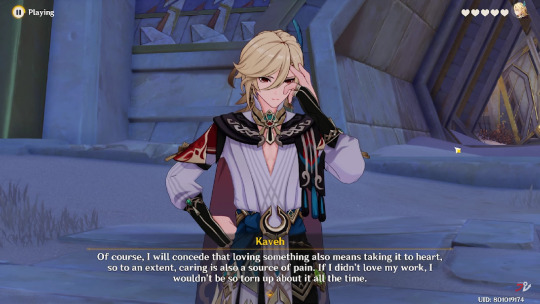
Drawing a parallel here can further contextualise Kaveh’s complaining of Alhaitham – if Kaveh truly disliked Alhaitham, there seems to be no reason for Alhaitham to remain so relevant to him, both in conversation, and in private thought. Additionally, Kaveh is described as an empathetic person, and when dealing with others, he is thusly seen to look for another perspective rather than act on his own subjective perspective.
Looking at his voice-line on Dori, for example, expresses his distaste for Dori pressuring him for Mora due to his debt, however, he also empathises with her, and states that he senses there must be a reason why Dori acts in such a way.

In contrast, this empathy can be perceived as missing in his treatment of Alhaitham, and therefore Kaveh complaining about Alhaitham can be perceived as blatant dislike – which contradicts Kaveh’s benevolence and empathy, which A Parade of Providence particularly stresses.
Kaveh’s treatment of Alhaitham can be seen as deliberately contradictory, as it can cause the player to question why Kaveh reacts in such a singular way to Alhaitham, just as why Alhaitham reacts in a singular way to Kaveh.
In reference to Alhaitham, whilst Alhaitham tends to complain about Kaveh in turn, his actions reveal him. He invites Kaveh to live with him, gives no eviction date, pays for Kaveh’s tabs willingly, (supposedly) buys wine as an apology, and goes out of his way to ensure dialogue with Kaveh – which contradicts his own character stories, in which he appears to favour solitude, and only greets those he considers his friends ‘with a nod or two’.

Moreover, Alhaitham is established as considering Kaveh a necessity to his ‘peaceful life’ he seeks to maintain (as discussed here), and can be seen to implicitly consider Kaveh one of his priorities within his Story Quest.
The idea that Alhaitham dislikes Kaveh seems to stem from Alhaitham being taken literally when voicing an opinion, or an issue, or simply joking, in reference to Kaveh – despite his character stories highlighting that Alhaitham often uses sarcasm in order to subvert expectations.

Alhaitham expressly states that he prefers to be seen as inscrutable, and unknown, by the general public, and uses subversion as a means to do so. In these character stories, Alhaitham openly encourages speculation of his own words.
Without this context, it seems easy to simplify Alhaitham to purely speaking factually when first addressing Kaveh in the Archon Quest – stating that having to explain things to Kaveh is ‘a nuisance’, and yet, it is overlooked that Alhaitham stays in the House of Daena, regardless, knowing Kaveh would find him again.
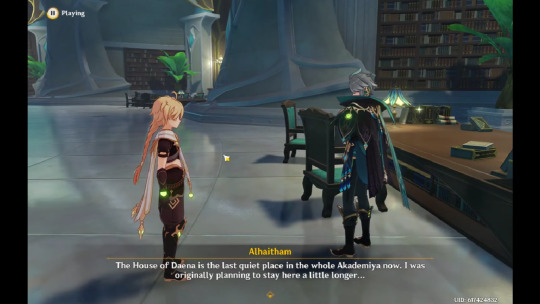
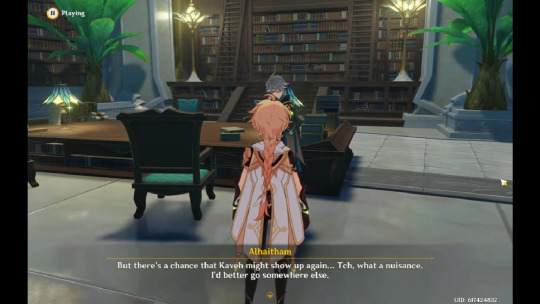

On the whole, in my opinion, Kaveh’s feelings towards Alhaitham cannot be simplified to ‘dislike’ as this is dually an inherent misunderstanding of his character, and of his and Alhaitham’s relationship, just as Alhaitham’s feelings towards Kaveh cannot be simplified to ‘dislike’ for this same reason.
In the beginning, Alhaitham and Kaveh are not supposed to be perceived as friendly, as Kaveh denies the association of ‘friends’, and Paimon describes them to the Traveller as ‘problematic’.

The reason for this is due to their character arcs being intertwined – the core issue is posed in Kaveh’s fifth character story, in that the question is raised if a compromise can be reached, if both sides of the mirror, can be balanced. At the beginning, they are entirely at odds, but even footing must be found.
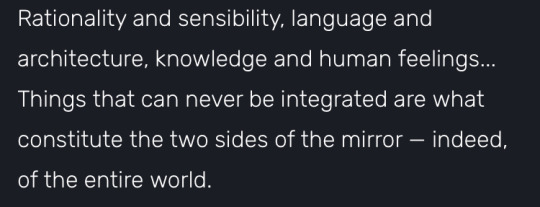
I’ve noticed a shift in online discourse after Cyno’s second story quest, as the progression in Alhaitham and Kaveh’s relationship is noticeable – deliberately, due to the flashback scene within their house (which I’ve discussed in detail here, page 122). To me, it’s more common to form the assumption that Alhaitham and Kaveh dislike each other in the Archon Quest, but with recent developments, and, hopefully, future ones, this perception is being overturned in online communities. Perhaps that’s just wishful thinking, but I’m still hopeful!
#haikaveh#kavetham#alhaitham#kaveh#genshin impact#thank you so much for your ask anon! it really ate away at my brain#haikaveh's writing is just so !?!?!? theres so many layers to peel back so a surface read of their relationship can be misconstrued as toxi#but ultimately i think these voice lines and details of their character stories are for people to question WHY they are Like That with#each other and it's one of the things i love about them that nothing is upfront or simple it really suits their themes so well#alhaitham constantly questions the world around him and flips language on its head and kaveh challenges the world with his ideals but works#with rigid principles of design and construction and he can't tell sarcasm from genuine praise which also adds to why he takes alhaitham's#words so personally... but this is improving now?? i am saying thank you cyno's second story quest <333#also the narrative that haikaveh can't stand each other seems to be more of a western thing from what i've seen online#and i think this is possibly due to the EN translation where the CN is less derisive or abrasive?#thank you to those who translate so the nuance is pointed out! <3
114 notes
·
View notes
Text
Traditional cultures are often criticized by the west but they've accepted harsh truths and have fewer social issues.
The western media in the western countries has had this misconception over hijabi women of Islam. The notion that all women are forced into hijab against their wishes. Let us educate you westerners on this : NOT ALL WOMEN ARE. MANY OF THE MORE PIOUS MUSLIM WOMEN DELIBERATELY WEAR HIJAB FOR THEIR MODESTY AND FOR THEIR RELIGION. It's a practice many Muslims women like and choose themselves. Let us also clarify one more thing - Not every woman wants to dress sexy,show skin and feel liberated in doing so. Rather, they hide their bodies and freely walk on earth feeling the power that only they own their bodies and no one can objectify them under a hijab. To them, that is true liberation. Such is the mindset of many pious Muslim females. 😇
Surely, there are situations where people who force girls and women into wearing hijab against their will and those are the women who revolt against hijab. If they donot want to wear, then they shall NOT wear and should not be forced. People like family members, relatives or institutions that make it mandatory for women to wear hijab tend to do so out of religiosity or simply age old culture. The religion itself does not force niqab or hijab on women. What Islam says is to dress sober.
This picture below is a MISPORTRAYAL of hijab and its meaning. The person who shared this photo on her wall with a certain caption is CLEARLY IN THE DARK about her knowledge on the subject. We won't mention her name here.
Hijab is NOT a symbol of oppression as thought by many westerners due to how it has been portrayed by Western news channels which these westerners consume. It is something else. Hijab has been historically part of cultural dress of hot desert countries before Islam was established. Arabians used it long before Islam was established.
We urge the people to speak to Muslims up front ,befriend them and ask as many questions they have in their minds about Islam to clear their confusions, read translation of Islam's Holy book before believing anything shown in western TV.

5 notes
·
View notes
Text
One of the most gratifying things about getting older is being secure in both my American and Iraqi identities. Like I used to think that I had to compromise one for the other, or that being half of each would always make me “diluted,” but I’ve never been more comfortable in my Arabness while simultaneously not caring for the western gaze & just making peace with what it means to be Iraqi American. Like I feel so lucky for my Iraqi heritage every day and I know that’s sadly not a feeling all Arabs experience……. But I cannot imagine being anything else and nor would I ever want to be
#it’s truly tragic that I had to grow into this rather than always having had it while younger#I’ve seen so many other Arab diaspora struggle w contending with the “white gaze” & trying to make themselves more digestible as a result#And I find the idealization of western culture from Arabs to be sad#Like I want to be as aggressively Arab as possible but in my OWN way#Im not waiting for anyone to teach me how to be what I am I’m just setting the guidelines for me and I love it#For example just bc I’m not religious doesn’t make me any less Arab
87 notes
·
View notes
Text
One thing I love about mutant mayhem is that Leo has a crush on an April who’s not conventionally attractive. It almost feels like, because of the turtles’ isolated upbringing* he hasn’t been influenced by the popular western beauty ideals and just thinks this ordinary human is beautiful! And I think that’s really cool! Because she is!
*though they’ve clearly been exposed to celebrities and other pop culture so ?? idk lol
#tmnt#mutant mayhem#I’m usually a very ‘I’m ugly and that’s okay’ type of person#but that’s really only about the definition of ugly that = not fitting into the popular western beauty ideals#but everyone has something about them that’s beautiful to someone yknow#idk I don’t want to be out here calling this April ugly because I don’t think she is#but I know a lot of male fans of older turtles have been saying she’s ugly#and yeah it’s very cool that this teenage boy character has a crush on an ‘ugly’ girl#and I know I have no stake in straight representation lol but it’s just good to see the girl crush have unconventional features#though I will say personally I don’t want them to be together just because any turtle x human relationship gives me the ick which is fully#just a me thing I think like I don’t think it’s morally reprehensible to ship any turtle with an april or karai (03 leo and karai had me#shipping them as a kid before I even knew what shipping was lol)#my words#ALSO whoever voiced dr stockman sounded SO similar to the 03 him. I was cryin#i feel like this movie wasn’t the best I mean I heavily enjoyed it but I hope it builds up to more. the mid credits scene had me screaming#so here’s hoping we get sequels aaaaa#give me karai or give me death#SMOOTH LIKE BUTTER LIKE A CRIMINAL UNDERCOVER
183 notes
·
View notes
Text
not pro jedi, not pro sith, but a secret third thing
#critical of the bastardization of eastern religion by western ideals send tweet#jedi critical#sith critical#i’m so sexy for this take at 11am on a tuesday
108 notes
·
View notes
Text
Yeah when I got asks like those, it had me debating...; were these asks just sent out of curiosity and a lighthearted manner to see something "cute" and "wholesome" or was it out of consideration to see some happy resolve for the characters (but I DON'T FEEL IT BEING SO CONSIDERATE ACTUALLY)
Or maybe it's because someone is in a place like Taiki and they'd want some validation and receive love and care from their biological parents too? That's also a possibility... I was careful about my own replies having that sort of thought in mind.
But it's so cruel. The whole situation is cruel. Just thinking about it really is painful. I don't know why I feel so intense over it but I think if Taiki wants love, he would have to ask for it somewhere else, it's not like he had any particular interaction or connection with him anyway. He isn't missing out a lot. Why can't people leave it as that?
How people react to situations may vary, but if I were to be born that way, I wouldn't force myself onto my biological parents... It's not a type of relationship you have to make up or have to be all loving and familial. You can end up becoming that way but in that whole situation, hikaru and taiki were both victims. None of them had real control over what happened. I realize my views may be shallow and may not as be thoughtful as much as I'd like myself to be but, I can't help thinking people...are too unaware and simplistic on topics like this. It feels that way because it's so difficult to see the thoughts that's led up to those inquiries. Have you thought it through? Have you thought how it'd feel if you were to be in those character's shoes? Good! If so, you should share your own insights. For me it's...tough. And I've been looking at documentaries, articles and interviews on this subject because I want to understand how people feel and go through, I do want to empathize with them. There could be as many reactions as there are stars in the sky and I would say none of them should be just brushed off as invalid. But I want to know if people have really considered and thought about these issues in depths before they do, because.. It's one of the few things I have a very strong idea about. I'm nowhere near an expert on the subject of rape and child abuse but it was always something I took very seriously and imbues a very strong type of emotion within me. And I believe it SHOULD be a subject taken as such.
#oshi no ko spoilers#sigh#I hope I never get any asks like that ever#I've never seen this being brought up so much on the.. idk? other side#is this a western fandom thing or what#and it makes me wonder just how old are the fans of this series is#not because I think it's a childish ask etc but..; I can't fully see the context where it's coming from so knowing the age of the asker-#would help; are they asking this because they think it's ideal-ate they really serious about child rape issues or what??
7 notes
·
View notes
Text
I'm willing to at least hear out most of the "xyz plot point is heavily tied to abc cultural context" brands of posts but the "wwx isn't meant to be read as morally gray" and "the western fandom made up Sizhui being wangxian's son" brands of post make me feel like my cultural ignorance is being used to gaslight me
#mdzs#vent post#the filial piety stuff in relation to jgy is incredibly interesting and has influenced my opinion on him#being told about the whole mo dao vs gui dao thing was very helpful since that is completely lost in the english translation#whether or not wwx's self sacrificing tendencies are supposed to be a good thing is a conversation i find interesting#even though i haven't come to my own conclusion on it yet#but wwx not being morally gray??? bro was a major player in a war- no ones coming out of that spotless#i also just straight up don't trust y'all about what mxtx said on him being morally ideal#y'all take her words out of context or just straight up lie about what she said so often that#I can't take anything y'all “repeat” from her at face value. i need links to the sources before I'll believe anything#on Sizhui being wangxian's son:#thats so embedded in the text the only way I'd believe it wasn't the intended reading is if 7 seas straight up rewrote section of the books#because its more than just a few throw away lines and wwx calling him his little one#its sizhui being formally adopted into the lans (proven by the cloud pattern headband)#its the extra where they take him on a nighthunt/investigation without any of the other disciples#its the paying extra attention to his hw while doing the grading#its in the miscellaneous anecdotes Sizhui remembers from wwx even after he lost his memories from early childhood#its the baby stories and sizhui chewing on wwx's flute#its Sizhui's unconditional faith in the two of them#its in Sizhui's choosing the same instrument as lwj#that is their kid!!! not through modern western adoption but thats still their kid!!!#sizhui developing a close relationship with his uncle doesn't change that#Wen Ning is the cool untaking the lan babies on field trips. wangxian are the ones actually raising him#also mxtx has been pretty open about being influenced by things other than chinese classics#so using “well traditional Chinese story telling uses this convention” will never be automatically be the correct™️ take on her work#not to say her stories are completely devoid of traditional structures its just she mixes in other styles too
8 notes
·
View notes
Text
Man, I really don't like how people treat suguru's defection as this easily solved thing.
#not even tagging this bc discourse is dumb and i don't want drama or to call people out#but no he didn't just need therapy#or antidepressants#this was a systemic issue#gojo couldn't have stopped him#the adults couldn't have stopped him either#he needed a community and a purpose that didn't feel fucking hollow#he physically and mentally improved when he had that#as wrong as it was#i could rant for days on how this is a perfect microcosm of an attempt to project hyper-individualist western ideals of mental health#when that's not what the story is saying and you guys could learn a lot by just... not doing that#sorry for the rant#this shit just touches me personally and makes me really depressed
8 notes
·
View notes
Text
I'll leave someone else to go deeper into this train of thought because I still need to do research on this in general, but I think there is something to be said about Mahiru, an east-asian woman, desperately trying to conform to pretty white/americanized standards of women, femininity, and romance
#like. maybe I'm looking too deep into it#but at the same time her ultimate dream is to be a housewife with a husband and two kids#that is like. very much the definition of a nuclear family which is very much a western concept#and with the way patriarchy and white supremacy works#even if you have everything else down the ideal woman is ultimately a white one#so it would make sense for Mahiru to copy those standards to the extreme#{ ⚖️ after knowing all I wonder. can you really forgive them? 👁️}#milgram#milgram project#mahiru shiina#shiina mahiru#milgram mahiru
13 notes
·
View notes
Text
im getting real sick of 'intelligence'
who decided reading books and writing counted as intelligence? who decided that getting high scores on a strict, unfeeling system meant you were better than everybody? who decided that people should be turned into numbers, tie their worth in society into numbers, to compare people on a scale that ultimately does not matter, so that the people who didn't dump everything to perform for it are berated and the people who did end up with nothing?
who decided not reading or writing was a lack of intelligence? who decided that living differently to them was a sign of lower 'societal worth' than those who conformed?
#r slur#and a big rant#in the following tags#this too is just a tool for oppression#but if you had been crushed in the grips of the education system and left limp in the dirt you knew that already#but it's not only a way for society to weed out the 'retards'. it's more than that#let me tell you something#estonia used to be in tribes around the 1000s-1200s or so#a lot of our old historical records were written by someone else#usually christian invaders and other occupying forces who thought we were barbaric and what have you#because we were pagan (especially with Taarapita) and *we did not have a written language*#according to christian-western ideals this means that our population must be like super dumb#and its 'our job' to enlighten them :)#and they did this with anyone who didn't conform.#intelligence has always been a tool to excuse it#so it feels good#so it feels right#You're 'helping' them. enlightening a primitive race#so that they follow Our standards#it's colonialism all the way down#and it still echoes into the modern day. we still see academia as intelligence while we ignore proficiency in other forms#let's not forget the classism of it either. i live in the CEO of classism#working class people are seen as dumber and are thus treated worse because they didn't dump all of their money/future money into#a societally-approved institution like oxford or something#despite the fact that they rely on working class people to operate#or the fact that their booksmarts don't cover years of knowing how to run a corner store#i suppose the general conclusion i want to convey is that we can all do different things well and using a linear scale is bullshit#(and an oppressive tool lol)#people are good at different things and you have to learn to be ok with that#this applies to anything - trades/ crafts/ booksmarts/ spectrums of neurodivergence/ etc
5 notes
·
View notes
Text

#For anyone interested I based these on an African#renaissance#western#and Asian ideal of beauty and range of features#I would’ve liked to be more nuanced but I think these are good for now#silm#silmarillion#silm polls#Luthien#luthien tinuviel
6 notes
·
View notes
Text

#personal#internets#at this rate I've unfollowed both of the kinda.. 'controvercial' blogs I've been following#since there was a good chunk of actually good takes about how bad media is now and society and braindead internet 'activists' that-#-had it too good in their western countries and NEEDED to invent the reason to bully and excile people#could honestly resonate with it despite some other posts causing genuine pain. but mostly about terribly handled media#like you know that thing when corporations do terrible ass rep to pretend that they care for minorities#or artificially fabricate online backlash against their new actors to show investors that people show interest for their product because-#-of all the clicks on their article?#like discussion of this kind sorta keeps me sober#as a person with BPD I get contaminated by opinions VERY easily and as an autist I will believe everything if it is put together 'logically#that's why I HAVE to be exposed to every possible opinion so I am forced to make out my own rather than being swayed anywhere#but at this point those blog became kinda.. bad? like they don't just have 'opinions' but they hate just to hate#but now my dashboard and recs are full of exclusively things I can fully agree with and I am scared that it will rot my brain#like.. emotions are always the same. where is the 'wait WHAT' effect? where is anger? where is self-reflection?#but ALSO I realized that 'those' blogs are no better than those western 'warriors' I despise and they become narrow-minded too in the end#they advertise themselves as 'open to debate' only to always sway debate into trying to win and not into actually discovering the truth#I cannot trust any side because they're all narrow-minded and hostile but I cannot trust people without any side because-#-they're fence-sitters without morals that side with the winner#is there a secret third thing? like is there a way to not take a side but to still HAVE ideals and opinions?#my problem is that if I am not exposed to people that trash everything I value I forget why AM I valuing [a thing] to BEGIN with#and that won't do will it
28 notes
·
View notes